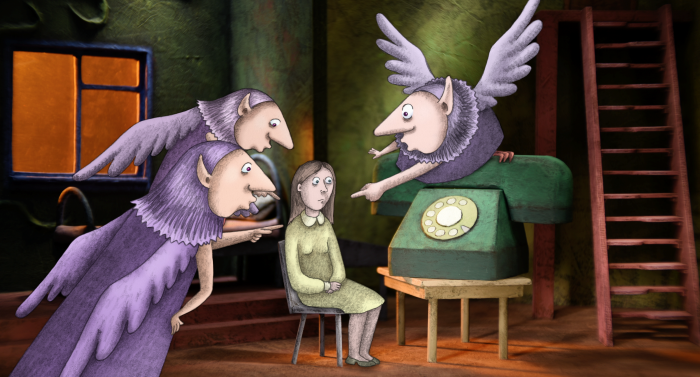![]() People say things like “Be yourself” or “You do you,” but even today those adages seem to come with an unsaid ellipsis of “…to a point.” Like “Be yourself…but don’t go too far out of bounds.” So even though many barriers have fallen, we are still told to fit in, especially women and gender non-conformists. But trying to fit into certain expectations that don’t fit you usually leads to mistakes and unhappiness, as originally and smartly depicted in Signe Baumane’s semi-autobiographical animated musical My Love Affair with Marriage. Yet, as the cheeky film reminds us, your past doesn’t have to be your future.
People say things like “Be yourself” or “You do you,” but even today those adages seem to come with an unsaid ellipsis of “…to a point.” Like “Be yourself…but don’t go too far out of bounds.” So even though many barriers have fallen, we are still told to fit in, especially women and gender non-conformists. But trying to fit into certain expectations that don’t fit you usually leads to mistakes and unhappiness, as originally and smartly depicted in Signe Baumane’s semi-autobiographical animated musical My Love Affair with Marriage. Yet, as the cheeky film reminds us, your past doesn’t have to be your future.
Zelma (voiced by Dagmara Dominczyk) comes of age in the Soviet Union (Latvia) during the 1970s and ’80s, a place and time that did not had much tolerance for nonconformity. From an early age, everyone informs the free-spirited Zelma that her sole goal as a female is to marry and have children. When her classmates criticize her, saying she doesn’t act like a girl, Zelma, fully in the throes of her first crush on a boy who ignores her, desperately tries to follow the model of the feminine popular girls. It’s not a good fit. By the time she becomes an adolescent, Zelma has already had it firmly drummed into her mind that she needs the approval of men (and preferably marriage proposals) to feel any kind of success, and she doesn’t know how to turn away from that mindset.
This is illustrated through interludes that explain how neurological processes are molded by and interact with the cues given to Zelma by her environment, like when Zelma’s brain responds so eagerly to an older man’s interest in her. We later learn why she finds it so hard to walk away from abusive first husband Sergei (Cameron Monaghan), and why she jumps so quickly into an uncomfortable marriage with second husband Bo (Matthew Modine), who himself is secretly struggling with the gender role assigned to him.
If I were teaching a class on animation, I would show this film. At first glance, its drawings might look like just simple 2D line artwork, but as the movie goes on, they are placed over layers of wooden backgrounds or miniature 3D figures that add depth—an example that 2D animation offers untold paths to creativity. Could this story be told as a live-action drama? Yes, I guess it could. But I have a feeling it would be ponderous and ordinary.
The performances are fine all around, and the songs, written by Kristian Sensini and performed by Trio Limonade, are clever. I did have some reservations about the biology/neuropsychology explainer segments. At first, I found them cute and helpful, like the one explaining why teenagers are so reckless. (Seriously, how do any of us make it to 25?) As the movie went on, though, I had some “Is this going to be on the quiz?” thoughts. But I’m not sure the film would be as effective without them.
My Love Affair with Marriage tackles serious issues and big questions with a light hand. Zelma might be just a drawing, yet she is a fully realized character, and it’s easy to feel for her as she stumbles her way through life. It’s a relief to see a film that is different and not afraid to be itself. Just like Zelma.








Leave A Comment